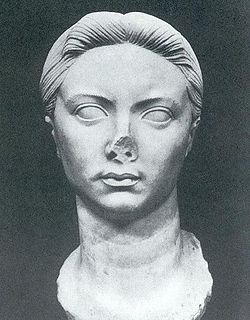Related Research Articles

AD 14 (XIV) was a common year starting on Monday of the Julian calendar. At the time, it was known as the Year of the Consulship of Pompeius and Appuleius. The denomination AD 14 for this year has been used since the early medieval period, when the Anno Domini calendar era became the prevalent method in Europe for naming years.
The 10s decade ran from January 1, AD 10, to December 31, AD 19.

Livia Drusilla was Roman empress from 27 BC to 14 AD as the wife of Emperor Augustus. She was known as Julia Augusta after her formal adoption into the Julian family in AD 14.
Lucius Aelius Seianus, commonly known as Sejanus, was a Roman soldier, friend and confidant of the Roman Emperor Tiberius. An equestrian by birth, Sejanus rose to power as prefect of the Roman imperial bodyguard, known as the Praetorian Guard, of which he was commander from AD 14 until his death in AD 31.

Publius Quinctilius Varus was a Roman general and politician under the first Roman emperor Augustus. Varus is generally remembered for having lost three Roman legions when ambushed by Germanic tribes led by Arminius in the Battle of the Teutoburg Forest, whereupon he took his own life.

The gens Julia was one of the most ancient patrician families in ancient Rome. Members of the gens attained the highest dignities of the state in the earliest times of the Republic. The first of the family to obtain the consulship was Gaius Julius Iulus in 489 BC. The gens is perhaps best known, however, for Gaius Julius Caesar, the dictator and grand uncle of the emperor Augustus, through whom the name was passed to the so-called Julio-Claudian dynasty of the first century AD. The nomen Julius became very common in imperial times, as the descendants of persons enrolled as citizens under the early emperors began to make their mark in history.
Gaius Asinius Gallus was a Roman senator, son of Gaius Asinius Pollio and Quinctia. He was the second husband of Vipsania, eldest daughter of Marcus Agrippa and first wife of Tiberius, who ultimately imprisoned him.

Vipsania Agrippina was the first wife of the Emperor Tiberius. She was the daughter of Marcus Vipsanius Agrippa and Pomponia Caecilia Attica, thus a granddaughter of Titus Pomponius Atticus, the best friend of Cicero.

Scribonia was the second wife of Octavian, later the Roman Emperor Augustus, and the mother of his only natural child, Julia the Elder. Through her youngest daughter she was the mother-in-law of the Emperor Tiberius, great-grandmother of the Emperor Caligula and Empress Agrippina the Younger, and great-great grandmother of the Emperor Nero.
Marcus Valerius Messalla Messallinus was a Roman senator who was elected consul for 3 BC.

The gens Pompeia was a plebeian family at ancient Rome, first appearing in history during the second century BC, and frequently occupying the highest offices of the Roman state from then until imperial times. The first of the Pompeii to obtain the consulship was Quintus Pompeius in 141 BC, but by far the most illustrious of the gens was Gnaeus Pompeius, surnamed Magnus, a distinguished general under the dictator Sulla, who became a member of the First Triumvirate, together with Caesar and Crassus. After the death of Crassus, the rivalry between Caesar and Pompeius led to the Civil War, one of the defining events of the final years of the Roman Republic.
Sextus Appuleius is the name of four figures during the 1st century BC and 1st century AD. The first Sextus Appuleius was married to Octavia Major, the elder half-sister of Augustus. The three subsequent figures named Sextus Appuleius are respectively the son, grandson and great-grandson of Sextus Appuleius (I) and Octavia Major.
Appuleia Varilla was a Roman noblewoman and the daughter of Quinctilla Varilla and Sextus Appuleius. She was a grand-niece of the emperor Augustus as her father was the son of Octavia Major.

Octavia the Younger was the elder sister of the first Roman Emperor, Augustus, the half-sister of Octavia the Elder, and the fourth wife of Mark Antony. She was also the great-grandmother of the Emperor Caligula and Empress Agrippina the Younger, maternal grandmother of the Emperor Claudius, and paternal great-grandmother and maternal great-great-grandmother of the Emperor Nero.
Octavia the Elder was the daughter of the Roman governor and senator Gaius Octavius by his first wife, Ancharia. She was the elder half-sister to Octavia the Younger and Roman Emperor Augustus.
Lucius Volusius Saturninus was a Roman senator who held several offices in the emperor's service. Saturninus attracted the attention of his contemporaries for his long life: he died at the age of 93, and having sired a son at the age of 62.
The gens Appuleia, occasionally written Apuleia, was a plebeian family at ancient Rome, which flourished from the fifth century BC into imperial times. The first of the gens to achieve importance was Lucius Appuleius, tribune of the plebs in 391 BC.
Sextus Nonius Quinctilianus was a Roman Senator. He was appointed consul in AD 8 as the colleague of Marcus Furius Camillus.
Marcus Appuleius was a nephew of the Roman emperor Augustus and Roman consul in 20 BC with Publius Silius Nerva as his colleague.
References
- ↑ Ronald Syme, History in Ovid (Oxford: Clarendon Press, 1978), p. 156
- ↑ Syme, History in Ovid, p. 158
- ↑ Dio 56.29.5
- ↑ Syme, History in Ovid, pp. 158f
- ↑ Dio 56.45.2
- ↑ CIL VI, 31689
- ↑ Ronald Syme, "The Early Tiberian Consuls", Historia: Zeitschrift für Alte Geschichte , 30 (1981), p. 196
- ↑ Seneca, De Tranquillitate Animi 11.10
- ↑ Syme, History in Ovid, pp. 162